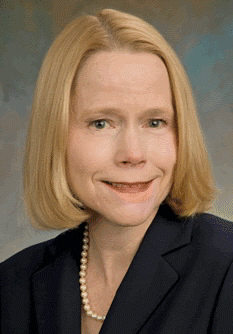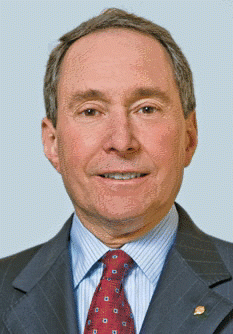PHOENIX-Cysts on vocal folds can be tricky lesions to tackle-more challenging than many otolargyngologists might think, a panel of experts said here.
Healing after surgery can be difficult to forecast, and the effects on the voice can be similarly hard to pin down until after surgery. Even determining whether a lesion is, in fact, a cyst, or whether it should be considered and handled as a polyp or a pseudocyst, is not always clear-cut, the panelists agreed during a discussion at the 89th Annual Meeting of the American Broncho-Esophagological Association, held as part of the Combined Otolaryngology Spring Meeting.
The panel was moderated by Jamie A. Koufman, MD, Director of the Voice Institute of New York. She was joined by Robert H. Ossoff, MD, Executive Medical Director of the Vanderbilt Voice Center; Gayle Woodson, MD, Chair of the Otolaryngology-Head and Neck Division at Southern Illinois University; C. Blake Simpson, MD, Director of the University of Texas Voice Center; and Michael Pitman, MD, Director of the Voice and Swallowing Institute at the New York Eye and Ear Infirmary.
Dr. Koufman said that cysts deserve more attention than many otolaryngologists give them. It seems to me that cysts have always been more challenging than people give them credit for, she said.
 Not every cyst has to be taken out. Just because you have a cyst there, it doesn’t have to be taken out. The patient has to be ready to take the risk of having his voice be worse in order to undergo the surgery. So the symptoms have to be enough to risk that.
Not every cyst has to be taken out. Just because you have a cyst there, it doesn’t have to be taken out. The patient has to be ready to take the risk of having his voice be worse in order to undergo the surgery. So the symptoms have to be enough to risk that.-Gayle Woodson, MD
Preoperative Preparation
Dr. Koufman asked the panel how they go about preparing their patients for cyst surgery. How many of your patients that you’re treating and you’re going to treat surgically do you cover with antireflux treatment in the perioperative period? she asked. Do you treat everyone and, if so, aggressively? Or is that not important to you?
Dr. Pitman said he would give his patients proton pump inhibitors (PPIs) for reflux if there’s any risk at all. He said that moderate to severe inflammation would be a contraindication to surgery. Dr. Woodson said she would also use PPIs.
Dr. Simpson said many of the patients who come to him are already being treated for reflux and that he rarely has to start them on the medication. I spend more of my time getting them off PPIs, he said.
Dr. Ossoff said the preparation is an important part of the treatment. Severe inflammation is, to me, a contraindication, he said. It’s just a time to stage and get them into better vocal health, so that when I do operate, I try to create an environment that might be more conducive to healing.
 Severe inflammation is, to me, a contraindication. It’s just a time to stage and get [patients] into better vocal health, so that when I do operate, I try to create an environment that might be more conducive to healing.
Severe inflammation is, to me, a contraindication. It’s just a time to stage and get [patients] into better vocal health, so that when I do operate, I try to create an environment that might be more conducive to healing.-Robert H. Ossoff, MD
Dr. Koufman said that treatment for inflammation might be necessary for surgeons to know what they’re really dealing with. Many patients who come in and look like they might have cysts have so much inflammation, she said. I view the antireflux treatment as part of the diagnostic process in evaluating a patient.
Patient Preparation and Informed Consent
All the panelists stressed the need for a thorough, honest preoperative discussion with the patient about the possible outcomes of surgery, including the possibility of a lengthy recovery time, and to get the patient to understand that, after treating cysts, permanent hoarseness can result.
Especially for cysts, you need a lot of counseling, Dr. Pitman said. Cysts sometimes don’t come out as well as polyps. There’s a little more risk of fibrosis, and there’s a little bit longer healing. And I would also make them visit with a voice therapist at least once or twice, so they really know what to expect after surgery in terms of their rehabilitation regimen.
Dr. Simpson agreed. That’s the big thing, he said. You have to prepare them for a longer period of voice rest, perhaps a longer period until they attain full voice. I always tell them this is going to be one of the hardest lesions to remove, so be prepared for a long recovery period.
Dr. Ossoff said that the expectations of the patient have to mesh with the procedure-the patient has to understand that, when it comes down to it, there is no sure way to predict the outcome.
In informed consent, you want to set the expectation for your patient, he said. You want to let them know this is the toughest type of lesion you operate on. The healing is predictably unpredictable and it can vary anywhere along a bell curve. You have to set that expectation, you have to let them know about how long it might be until they might be back to full vocal voice. If you don’t set that proper expectation, you have very disappointed patients. The time to do it is before you operate. That’s when everything you say is plausible and believable, and if you wait until afterward to tell them these things, it’s sort of like you’re making excuses.
Whether to remove a cyst at all takes careful consideration, the panelists said. Not every cyst has to be taken out, Dr. Woodson said. Just because you have a cyst there, it doesn’t have to be taken out. The patient has to be ready to take the risk of having his voice be worse in order to undergo the surgery. So the symptoms have to be enough to risk that.
That is where intensive voice therapy is crucial, she said. I think they need to really go through a session for voice therapy and see what’s the best voice they can get out of this. So that they can compare that and see, ‘Okay, this is the best voice we can get.’ Then we can make a decision from there about the surgery.
Making matters worse, she said, a lot of times you don’t know what you’re dealing with until you’re in there. Essentially, the cyst is this space-occupying lesion. Sometimes you take it out and you’ve got a big divot left, so I’m very cautious before I go in and operate on a cyst, Dr. Woodson said.
It really comes down to what the patient wants, Dr. Ossoff said. When you’re dealing with professional voices, whether they be singers, broadcasters, or whatever, you almost empower them to tell you, he said. When they don’t know what’s coming out of their mouths, when they’ve lost their confidence…they’ll sort of tell you, ‘I am ready.’
He added, They need to be ready and you can’t talk them into being ready.
Part 2 of this article will feature several case studies involving vocal fold cysts.
©2009 The Triological Society
Leave a Reply